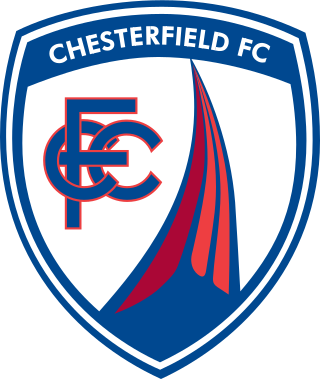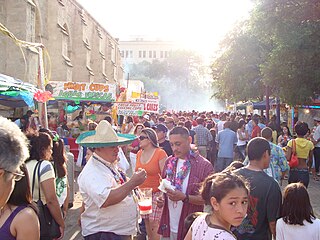
Carnival or Shrovetide is a festive season that occurs at the close of the Christian pre-Lenten period, consisting of Quinquagesima or Shrove Sunday, Shrove Monday, and Shrove Tuesday or Mardi Gras.

Derbyshire is a ceremonial county in the East Midlands of England. It borders Greater Manchester, West Yorkshire, and South Yorkshire to the north, Nottinghamshire to the east, Leicestershire to the south-east, Staffordshire to the south and west, and Cheshire to the west. Derby is the largest settlement, and Matlock is the county town.

Chesterfield is a market and industrial town in the ceremonial county of Derbyshire, England. It is 24 miles (39 km) north of Derby and 11 miles (18 km) south of Sheffield at the confluence of the Rivers Rother and Hipper. In 2011, the built-up-area subdivision had a population of 88,483, making it the second-largest settlement in Derbyshire, after Derby. The wider Borough of Chesterfield had a population of 103,569 in the 2021 Census. In 2021, the town itself had a population of 76,402.

Long Eaton is a town in the Erewash district of Derbyshire, England, just north of the River Trent, about 6 miles (9.7 km) south-west of Nottingham and 9 miles (14 km) south-east of Derby. The town population was 37,760 at the 2011 census. It has been part of Erewash borough since 1 April 1974, when Long Eaton Urban District was disbanded.

Chesterfield Football Club is a professional association football club based in the town of Chesterfield, Derbyshire, England. The team competes in EFL League Two, the fourth level of the English football league system, after winning the 2023–24 National League title.

Bamford is a village in the Peak District, Derbyshire, England, close to the River Derwent. To the north-east is Bamford Edge, and to the north-west the Ladybower, Derwent and Howden Reservoirs. At the 2011 census, it had a population of 1,241.

Sir John Gell, 1st Baronet was an English landowner from Derbyshire, who acted as local Parliamentarian commander for most of the First English Civil War before resigning in May 1646. He was notorious for parading the body of his Royalist opponent through Derby after the Battle of Hopton Heath in March 1643.

The Mercian Regiment is an infantry regiment of the British Army, which is recruited from five of the counties that formed the ancient kingdom of Mercia. Known as 'The Heart of England's Infantry', it was formed on 1 September 2007 by the amalgamation of three existing regiments. The Regiment has had fifteen operational deployments since its formation.

The Jersey Battle of Flowers is an annual carnival held in the Channel Island of Jersey on the second Friday and Saturday of August. The festival consists of music, funfairs, dancers, majorettes and a parade of flower floats alongside various street entertainers. It was inaugurated in 1902 to celebrate the coronation of King Edward VII and Queen Alexandra. The largest attendance to date is thought to be that of 1969 when 60,000 people were present. Current spectator numbers are around 20,000.

The Barranquilla Carnival is one of Colombia's most important folkloric celebrations, and one of the biggest carnivals in the world. The carnival has traditions that date back to the 19th century. Four days before Lent, Barranquilla decks itself out to receive national and foreign tourists to join together with the city's inhabitants to enjoy four days of intense festivities. During the carnival, Barranquilla's normal activities are put aside as the city gets busy with street dances, musical and masquerade parades. The Carnival Of Barranquilla includes dances such as the Spanish paleo, African Congo, and indigenous mice y mica's. Many styles of Colombian music are also performed, most prominently cumbia, and instruments include drums and wind ensembles. The Carnival of Barranquilla was proclaimed a Cultural Masterpiece of the Nation by Colombia's National Congress in 2002. Also the UNESCO, in Paris on November 7, 2003, declared it one of the Masterpieces of the Oral and Intangible Heritage of Humanity, and it was during Olga Lucia Rodriguez Carnival Queen year.

The carnival in Colombia was introduced by the Spaniards. The Colombian carnival has incorporated elements from European culture, and has managed to syncretise, or re-interpret, traditions that belonged to the African and Amerindian cultures of Colombia. There is documentary evidence that the carnival existed in Colombia in the 17th century and had already caused concern to the colonial authorities, who censored the celebrations, especially in the main centers of power such as Cartagena, Bogotá and Popayán. The carnival, therefore, continued its evolution and re-interpretation in the small and at that time unimportant towns where celebrations did not offend the ruling elites. The result was the uninterrupted celebration of carnival festivals in Barranquilla, and other villages along the lower Magdalena River in northern Colombia, and in Pasto, Nariño in the south of the country. In modern times, there have been attempts to introduce the carnival in the capital, Bogotá, in the early 20th century, but it has always failed to gain the approval of authorities. The Bogotá Carnival has had to wait until the 21st century to be resurrected, this time, by the authorities of the city. Colombia is recognized by its large variety of festivals, carnivals and fairs. Most towns have their own, ranging from those celebrating coffee to the ones held in honor of the town's Saint feast. The common characteristics of the festivals are the nomination of a beauty Queen and the setting up of public dance floor.

Tupton is a village and civil parish in North East Derbyshire, Derbyshire, England, 5 miles (8 km) south of Chesterfield. The population of the civil parish including Egstow and Old Tupton was at the 2011 Census 3,428. It lies just north of Clay Cross on the A61 which runs from Chesterfield to Alfreton. It comprises the areas of Old Tupton and New Tupton. However, it is generally referred to as Tupton. A similarly named area, Tapton, is a few miles away, being part of Chesterfield.

The Antiguan Carnival is a celebration of emancipation from slavery, held annually on the island of Antigua. It is a thirteen-day festival of colorful costumes, beauty pageants, talent shows, and music. The festival begins in late July and ends the first Tuesday in August, known as Carnival Tuesday. Both Carnival Monday and Carnival Tuesday are public holidays on the island. Antiguan Carnival replaced the Old Time Christmas Festival in 1957, with hopes of inspiring tourism in Antigua and Barbuda. Some elements of the Old Time Christmas Festival remain in the modern Carnival celebrations.

Fiesta San Antonio has been since its 1891 inception an annual festival held in April in San Antonio, Texas. It is the city's signature event, along with some events held in the neighboring cities: Boerne, Schertz, Windcrest, Balcones Heights, and Alamo Heights). The festival, also known as the Battle of Flowers, commemorates of the Battle of the Alamo, which took place in San Antonio, and the Battle of San Jacinto, which led to Texas' independence from Mexico in April 1836.

A flower parade is a parade in which the floats, vehicles, boats, participants, animals and other things are decorated or covered in flowers. Often there are other elements like marching bands and people in costumes. Flower parades are held in several countries, many of which celebrate the forthcoming of the seasons. The oldest flower parade dates back to the 1800s.

The Derby Serenaders International Showband were a Marching band based in Derby, England. Due to the flair and originality of their uniforms and displays, and their highly original musical arrangements, they are generally considered to be one of the best and most successful carnival/marching bands in history.

A Breton is a woman's hat with a round crown and a deep brim that is turned upwards all the way round, exposing the face. Sometimes the hat has a domed crown. Typically it is worn tilted to the back of the head.

The Ambassadors Showband Derby is a marching band based in Derby, England
The High Peak Rifles, later 6th Battalion, Sherwood Foresters, was a volunteer unit of Britain's Territorial Army. First raised in the High Peak area of Derbyshire in 1860, it fought as infantry on the Western Front during the First World War and as an air defence unit during the Second World War. Its descendants remained in the Army Reserve until 2014.





















